Nutrients in soil runoff from farms after heavy rains can feed harmful algal blooms in Lake Erie and other bodies of water around the world.
Focused on sustainability, a chemical engineer at The University of Toledo is developing new technology to transform agricultural waste into a valuable resource, reduce pollution and improve water quality.

Dr. Sridhar Viamajala is developing new technology to transform agricultural waste into a valuable resource, reduce pollution and improve water quality.
Dr. Sridhar Viamajala, professor of chemical engineering, received a $145,000 grant from the Ohio Water Development Authority to collaborate with Applied Environmental Solutions LLC on a project to create an industrial way to remove and recover ammonia from dairy cow manure to use in other technologies such as plant fertilizer.
The new technology would create the opportunity for farmers to sell ammonia as a raw material to manufacturers as well as stop it from ending up in the water.
“This project will develop innovative membrane-based technologies to recover and reuse ammonia from dairy cow and other livestock operations including hog farms,” Viamajala said. “The solutions developed will allow economically viable waste management at farm scales leading to mitigation of algae blooms in our region.”
The plan is to create a large unit with a gas filter. The operator would haul manure into the machine, which would separate the ammonia from the liquid.
“The ammonia, usually responsible for the odor of manure, would come out as a clean product that could be reapplied for agriculture as a fertilizer,” Viamajala said. “We are developing equipment that is easy to operate and can be usable on-site at farms.”
Another benefit is that it could remove some of the smell.
“If ammonia goes into the air, it causes odor problems,” Viamajala said. “If it gets into water, it fuels the harmful algal bloom.”